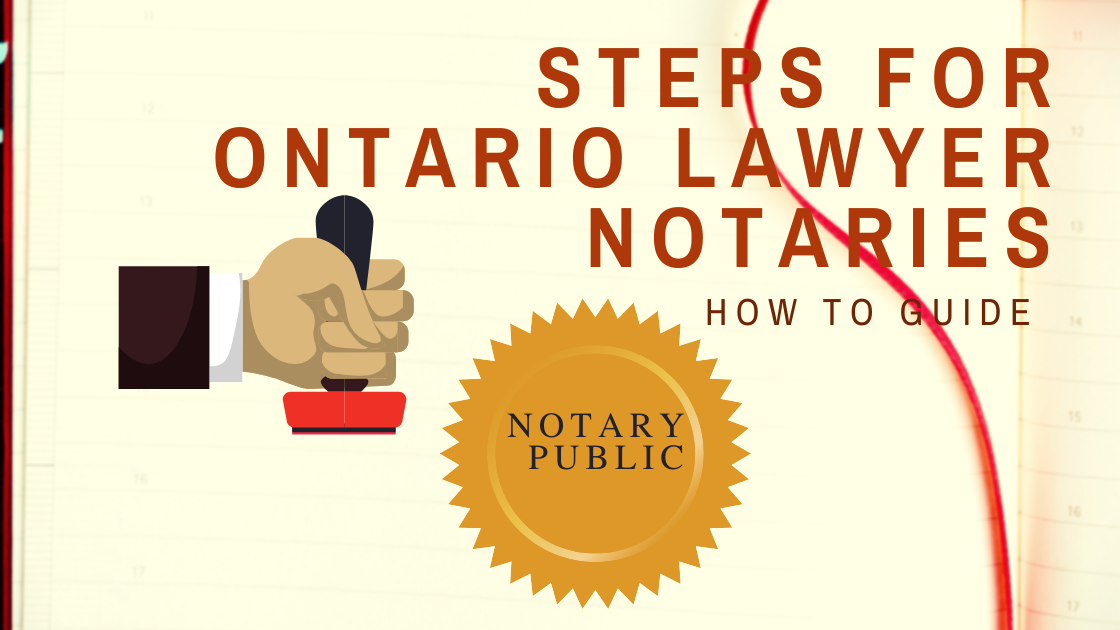Are you interested in becoming a notary public in Ontario? This role is crucial in law, finance, and real estate industries and provides ample opportunity for professional growth and development.
However, the process of becoming a notary can seem daunting at first. From meeting the necessary requirements and qualifications to obtaining practical experience and passing exams, there are several steps involved.
In this article, we will provide a comprehensive guide on how to become a notary in Ontario. Whether you are just starting your career or looking to expand your skillset, we have got you covered!
Read on to discover the steps needed to become a licensed notary public in Ontario and start your journey towards a rewarding career today.
Understanding the Role of a Notary in Ontario
In Ontario, notaries play a crucial role in legal processes by acting as impartial witnesses and providing legal authentication for important documents. To become a notary, it is essential to understand the responsibilities and duties that come with this profession.
A notary in Ontario is responsible for verifying the identity of individuals signing legal documents and ensuring that they do so voluntarily and with full understanding of the contents of the document. Notaries also certify copies of documents as true copies and may administer oaths or affirmations in legal proceedings.
One of the most important duties of a notary is to notarize documents. This involves verifying that a document is authentic and signing it to indicate that the person who signed it did so in their presence. Notaries must also keep accurate records of all notarial acts.
Overall, the role of a notary in Ontario is highly respected and offers a rewarding career for those who are interested in the legal field. With proper training and certification, notaries can make a significant contribution to the legal system and help individuals and businesses navigate complex legal processes.
Meeting the Notary Public Requirements in Ontario
Becoming a notary in Ontario requires specific qualifications and certifications. Meeting these requirements is essential to obtain notary certification and begin practicing as a notary.
The main qualification to become a notary in Ontario is to be a licensed lawyer or paralegal authorized to practice law in Ontario. Additionally, you must be at least 18 years old, a Canadian citizen or permanent resident, and have a clear criminal record.
After confirming that you meet these basic requirements, you will need to complete the application process to become a notary in Ontario. The application includes submitting a completed application form and the required fee, as well as supporting documents, such as proof of identity, residency, and professional status.
One of the most critical steps in the application process is passing the notary public exam in Ontario. The exam tests your knowledge of the laws, regulations, and procedures relevant to notarial practice in Ontario. You can prepare for the exam by taking a notarial practice course or studying independently.
After successfully completing the exam, you will need to submit your notary public application to the Ministry of the Attorney General, which may take up to four months to process. Once approved, you will receive your notary certificate, allowing you to begin practicing as a notary in Ontario.
Obtaining Notarial Practice Experience in Ontario
Once you have completed your notary public training, the next step in becoming a notary in Ontario is gaining practical experience in notarial practice. Notarial practice experience is essential to develop the necessary skills and expertise to notarize documents and provide legal authentication.
To obtain notarial practice experience, you can take the Ontario Notarial Practice Exam, which is a written test that assesses your knowledge and understanding of notarial practice. This exam is administered by the Ministry of the Attorney General and covers various topics, including the role of a notary, document preparation, and client communication.
In addition to taking the exam, you may also consider enrolling in a notary public training program that includes practical experience. These programs can provide you with the opportunity to work with experienced notaries, observe notarial acts, and practice notarizing documents under supervision.
It’s important to note that Ontario law requires notaries to maintain their notarial practice experience throughout their career. This means that you will need to regularly update your knowledge and skills through continuing education and professional development opportunities.
Applying for Notary Certification in Ontario
After meeting the requirements to become a notary in Ontario, the next step is to apply for notary certification. The application process requires specific documents and fees, and careful attention to detail will ensure a smooth and successful application.
Applicants must complete a Notary Public Application Form, which is available on the Ministry of the Attorney General website. The form requires personal details, educational background, and work experience. It must be notarized by a current notary public or a lawyer, and an original copy must be submitted to the ministry.
In addition to the application form, candidates must also provide a criminal record check from their local police department, as well as a credit check from a recognized credit bureau. These documents must be dated within six months of the application submission.
The application fee for notary certification in Ontario is $150, which must be paid by certified cheque or money order to the Minister of Finance. The fee is non-refundable and covers the cost of processing the application.
Once all documents are submitted and the fee is paid, the Ministry of the Attorney General will review the application and may request additional information if necessary. If the application is approved, candidates will receive notification and instructions for completing the remaining steps to become a notary in Ontario.
Notary Public Training Programs in Ontario
If you’re interested in becoming a notary public in Ontario, it’s important to have the necessary training and skills to succeed in this profession. Fortunately, there are several notary public training programs available in Ontario that can help you build the knowledge and experience you need to excel.
These training programs are designed to provide you with a comprehensive understanding of the rules and regulations governing notarial practice in Ontario, as well as the skills and tools you need to succeed in this field. Some of the topics covered in these training programs include:
- Legal frameworks and regulations
- Notarial procedures and document preparation
- Ethical considerations and best practices
- Communication and client management skills
- Technology and administrative tools
Additionally, many of these programs will include hands-on training and practical experience, giving you the opportunity to put your skills and knowledge into action in real-world settings. This can be invaluable when it comes to obtaining notarial practice experience and preparing for the Ontario notarial practice exam.
Types of Notary Public Training Programs in Ontario
There are several different types of notary public training programs available in Ontario, depending on your needs and preferences. Some of the most common types include:
| Program Type | Description |
|---|---|
| In-person programs | These programs are held in physical classrooms or training centers, allowing you to learn from experienced instructors and network with other aspiring notaries. |
| Online programs | These programs are delivered entirely over the internet, allowing you to learn at your own pace and on your own schedule. |
| Self-study programs | These programs provide you with study materials and resources that you can use to learn on your own, without formal instruction. |
Regardless of the type of program you choose, it’s important to ensure that it is accredited and recognized by relevant professional organizations and associations. This can help you gain credibility and recognition in the field, and ensure that you receive high-quality instruction and training.
Notary Public Exam in Ontario
The notary public exam in Ontario is a crucial step in becoming a certified notary. The exam is designed to test your knowledge of the laws and regulations related to notarial practice in Ontario, and your ability to apply that knowledge in real-world situations.
The exam consists of two parts: a written exam and a practical exam. The written exam is a multiple-choice test that covers topics such as legal concepts, ethics, and notarial procedures. The practical exam, on the other hand, requires you to demonstrate your ability to perform notarial acts such as document authentication and certification.
To prepare for the exam, it is recommended that you enroll in a notary public training program in Ontario. These programs will provide you with the knowledge and skills needed to pass the exam, as well as hands-on experience in notarial practice.
On exam day, arrive early and be sure to bring two pieces of valid identification, including one government-issued photo ID. The exam is timed, so manage your time wisely and read each question carefully before responding.
To succeed in the notary public exam in Ontario, it is important to prepare thoroughly and approach the exam with confidence and a clear understanding of the laws and regulations governing notarial practice in the province.
Benefits of Being a Notary in Ontario
Aside from the lucrative career opportunities and professional growth, notaries in Ontario enjoy numerous other benefits. Becoming a notary in Canada allows you to provide valuable services to your community, such as legal authentication of documents. Some additional benefits of being a notary public in Ontario include:
- Flexible work schedule: Notaries in Ontario are often self-employed and can set their own schedules, allowing them to balance work and personal life.
- High demand: As Canada’s population grows, the need for notarial services continues to increase, providing a steady stream of clientele.
- Professional networking: As a notary in Ontario, you will have the opportunity to network with other professionals, including lawyers, real estate agents, and government officials.
“Becoming a notary is an excellent way to build a successful career while serving your community.”
Moreover, notaries in Ontario enjoy the prestige that comes with being a trusted and respected member of the legal profession. With the right training and certification, you can join the ranks of the many successful notaries in Canada and enjoy all the benefits that come with this rewarding career.
Notary Public Associations and Organizations in Ontario
For aspiring notaries in Ontario, joining a professional association or organization can provide valuable support and resources. These groups offer opportunities to connect with fellow notaries, access training and educational resources, and stay up-to-date on industry news and developments.
One such organization is the Society of Notaries Public of Ontario (SNPO). Founded in 1964, the SNPO represents notaries public across the province and provides members with a variety of benefits, including access to professional development events, networking opportunities, and a job board.
Another organization worth considering is the Ontario Notary Association (ONA). This group focuses specifically on the needs and interests of notaries in Ontario and provides members with a range of resources, including educational programs, networking events, and advocacy efforts on behalf of the profession.
Membership requirements for these organizations vary, but in general, individuals must hold a valid notary public commission in the province of Ontario and pay a membership fee. Some organizations may also require members to complete a certain number of continuing education credits each year.
Overall, joining a notary public association or organization can be a valuable investment for professionals in this field, providing opportunities for growth and support throughout their careers.
Maintaining Notary Public Status in Ontario
Once you have become a notary in Ontario, it is important to maintain your certification in order to continue practicing. This requires ongoing attention and dedication to meeting the requirements set forth by the province.
One of the key requirements for maintaining notary public status in Ontario is completing continuing education courses. These courses are designed to keep notaries up-to-date on changes in the law, best practices, and new developments in notarial practice. You must complete a predetermined number of hours of continuing education courses in order to renew your certification each year.
In addition to continuing education, you must renew your notary public certification every year by paying a fee and submitting the necessary paperwork to the province. You must also maintain an accurate record of all notarial acts performed, including detailed information about the documents notarized and the parties involved.
It is important to note that notaries in Ontario are held to strict ethical standards and must uphold the highest level of professionalism in their practice. Failure to do so can result in disciplinary action or loss of certification.
Overall, maintaining notary public status in Ontario requires ongoing effort and attention to detail. However, the benefits of being a notary in Ontario, including the ability to provide essential legal services to the public, make the effort worthwhile.
Ethical Guidelines for Notaries in Ontario
Notaries in Ontario play an important role in society, and with that role comes a great deal of responsibility. As such, notaries are expected to adhere to strict ethical guidelines in order to maintain the trust and confidence of their clients and the public. Here are some key principles that all notaries should strive to uphold:
- Professionalism: Notaries should conduct themselves in a professional and courteous manner at all times. This includes dressing appropriately, communicating clearly, and behaving ethically.
- Confidentiality: Notaries must keep all client information confidential, unless authorized or required by law to disclose it.
- Impartiality: Notaries must remain impartial and unbiased in the performance of their duties. They should not have any personal interest in the documents they are notarizing.
- Competence: Notaries should only perform notarial acts that they are qualified to perform and should constantly strive to improve their knowledge and skills through training and education.
- Integrity: Notaries should maintain the highest standards of integrity and honesty, and avoid any conduct that could be perceived as improper or illegal.
It is important for notaries to remember that their actions and decisions can have a significant impact on the lives of their clients. By adhering to these ethical guidelines, notaries can help ensure that they are making a positive contribution to society and upholding the integrity of their profession.
Conclusion
Now that you have a better understanding of the process to become a notary in Ontario, you can take the necessary steps to pursue this rewarding career path. Remember that becoming a notary requires dedication, hard work, and ongoing commitment to upholding ethical and professional standards.
By following the guidelines outlined in this article, you can successfully navigate the certification process, gain valuable practical experience, and build a successful career as a notary public in Ontario. Whether you choose to work independently or as part of a larger organization, being a notary offers a range of benefits, including flexibility, job security, and opportunities for professional growth and development.
Start your journey today!
Don’t wait any longer to pursue your dream of becoming a notary public in Ontario. With the right training, experience, and certification, you can build a successful and rewarding career in this exciting field.
FAQ
Q: How do I become a notary in Ontario?
A: To become a notary in Ontario, you must meet specific requirements and obtain the necessary certifications. This includes completing the application process and any required exams.
Q: What are the responsibilities of a notary in Ontario?
A: As a notary in Ontario, your duties include notarizing documents and providing legal authentication. You play a crucial role in certifying the authenticity of important legal paperwork.
Q: What are the requirements to become a notary public in Ontario?
A: Meeting the notary public requirements in Ontario involves completing the application process and any necessary exams. It is important to ensure you meet all the qualifications and provide the required documentation.
Q: How can I gain notarial practice experience in Ontario?
A: Gaining practical experience in notarial practice is essential. There are various training programs and exams available in Ontario that can help you obtain the necessary skills and knowledge.
Q: How do I apply for notary certification in Ontario?
A: Applying for notary certification in Ontario requires submitting the necessary documents and paying the required fees. It is essential to follow the application process carefully to ensure your certification is granted.
Q: Are there any notary public training programs in Ontario?
A: Yes, there are several notary public training programs available in Ontario. These programs vary in duration, cost, and curriculum, providing aspiring notaries with the knowledge and skills needed for the profession.
Q: What does the notary public exam in Ontario entail?
A: The notary public exam in Ontario tests your knowledge and understanding of notarial practices. It is important to prepare adequately and familiarize yourself with the format and content of the exam.
Q: What are the benefits of being a notary in Ontario?
A: Becoming a notary in Ontario opens up various career opportunities and offers professional growth. Notaries play a vital role in legal processes and can enjoy the advantages that come with their expertise.
Q: Are there any professional associations for notaries in Ontario?
A: Yes, there are professional associations and organizations that support notaries in Ontario. These associations offer benefits and have membership requirements that can enhance your professional development.
Q: What are the ongoing responsibilities for notaries in Ontario?
A: Notaries in Ontario are required to fulfill certain ongoing responsibilities, including completing continuing education and renewing their certification. It is important to stay updated and maintain your status as a notary.
Q: What ethical guidelines should notaries in Ontario follow?
A: Notaries in Ontario are expected to adhere to ethical guidelines that emphasize integrity and professionalism. Upholding these standards ensures trust and reliability in the notarial profession.




